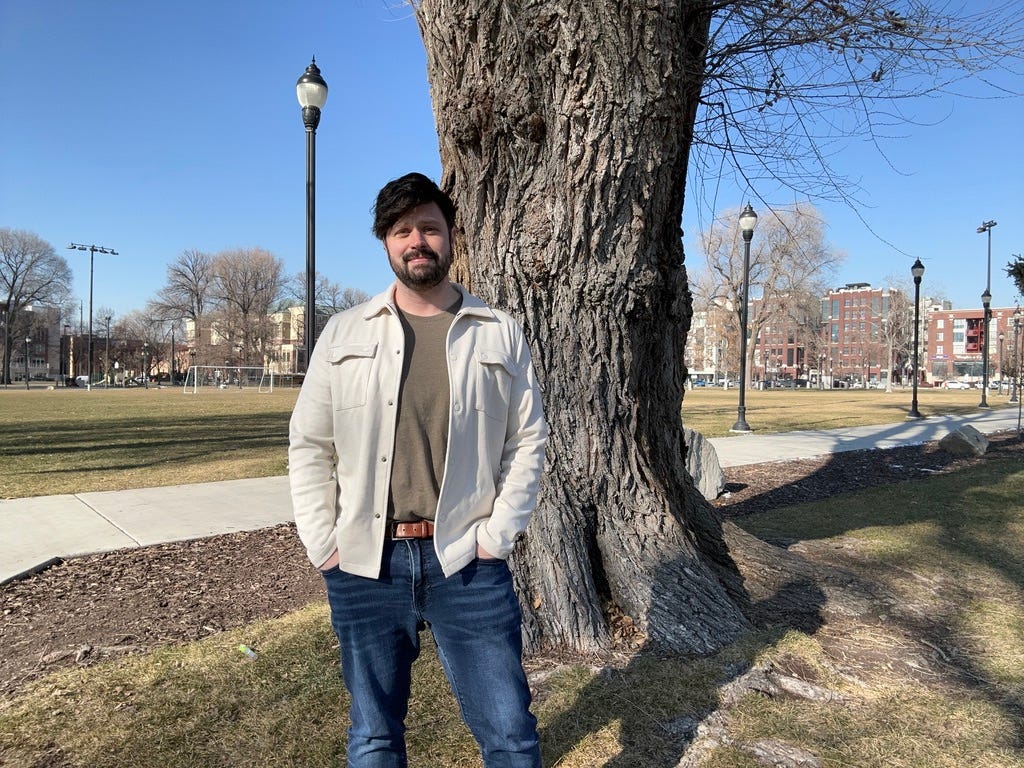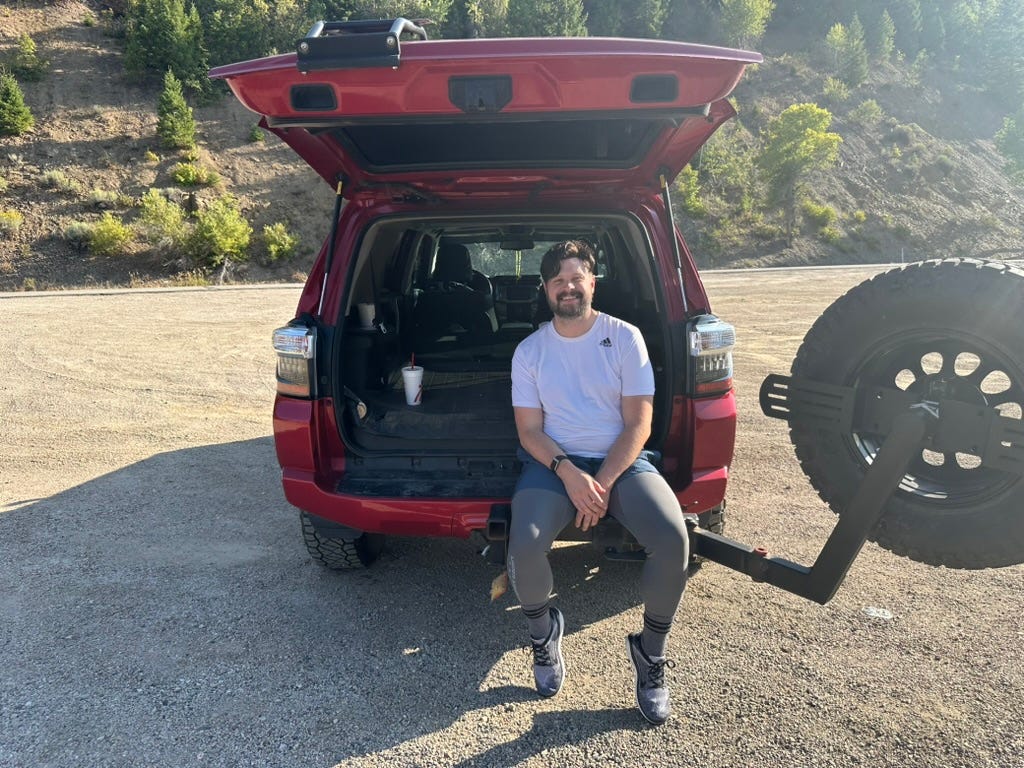I Almost Walked Past Him (and why that matters)
How the smallest interruptions of our automatic responses create the biggest cultural shifts
I almost walked past him.
Downtown on a Thursday, that familiar weight pressing against my chest. Concrete and steel everywhere, the kind of urban density that makes you forget you're a living thing.
I was three blocks from FedEx when he stepped into my peripheral vision.
"Excuse me. I'm not asking for money. I just need food. I haven't eaten a good meal for several days now."
My hand reached for my pocket automatically. The excuse forming before I could stop it:
Sorry, I don't carry cash.
Which is true. And it was a socially acceptable excuse. No one would blame me, not even myself. Hell, I had even been homeless, and I wouldn’t have blamed me.
I almost said it.
Almost chose the path that keeps us all safely separate. Almost applied the brakes to an inconvenient moment of human contact.
The people who walk past aren't monsters. We're trained for efficiency.
But something made me pause.
"Actually," I heard myself saying, "let me buy you lunch."
The Microstructures We Don't Notice
We ended up at some burger place with fluorescent lighting and the smell of fry oil hanging in the air. People stared at him while he ordered, the hum of the drink cooler filling the silence. I stayed while we waited for his food. People were already trying to make it clear he wasn’t welcome.
I made clear he was.
We talked about food. Both of us loved bacon, but only if it's crispy. Both of us were hard no on lettuce. We laughed about that.
"Good man," I said about the lettuce thing. He grinned.
We diverged on the shake. I’m a cookie dough all the way kind of guy. Him? Peanut butter cup reminds him of an uncomplicated childhood, before his teenagehood took a turn for the worse.
For maybe ten minutes, it was just two humans talking about bacon preferences. Nothing performed. Nothing complicated.
He got his burger, large fry, and large peanut butter shake. I left him there eating this heart attack trifecta and walked to FedEx.
When I picked up my documents, the cashier said, "You have a ladybug on your shoulder."
I did. 🐞
A small little thing with lots of spots, just nestled in like it belonged. A small sense of wonderment entered my heart.
"I must have picked her up on my walk over," I said with a smile. "I'll let her fly free outside." I finished looking through the printed documents, inspecting carefully, so as not to disrupt my little companion.
Walking back into the afternoon, something clicked.
Even in all this concrete, aliveness finds us.
This is what I mean by microstructures. The tiny encounters that either reinforce disconnection or crack it open just a little.
What We're Really Powerless Against
We tell ourselves we're powerless to change the world's megastructures.
The systems that reward performance instead of connection. That make humans seem like an inconvenience. That teach us to walk past each other with rehearsed excuses ready.
And that's true. I can't fix capitalism, housing policy, or the factors that put people on street corners asking for food. I can’t fix the mess that is our cascading global crises, or even just our unfolding national one. There is a whole lotta… “I can’t.”
But, that isn't the whole story.
We're not powerless over the microstructures.
Every day we make dozens of tiny choices. Someone asks for help and we either harden or soften. A conversation happens and we either perform or tell the truth. We either reach for the familiar excuse or risk something real.
These aren't grand gestures. Most people won't notice. But they accumulate.
Culture rarely shifts by decree. It shifts by interruptions of our automatic responses.
The moment we catch ourselves reaching for the comfortable excuse and choose differently. Not because we're saints. Not because we have endless compassion. But because something in us recognizes that the world we're walking through is the world we're creating.
One encounter at a time.
The Training We All Received
Most of us default to protecting our energy. We stay safe. We keep moving toward our destinations.
"Protect your peace," we hear. And there is wisdom in this mantra - boundaries matter, energy is finite, and self-care isn't selfish.
For many of us, those protective walls were developed for good reasons. They kept us alive when connection wasn't safe, when openness led to harm, when walking past was the smartest choice available.
But we exist in relationship to something larger than ourselves. As John Kwano puts it:
"We are inter-related, inter-connected, and inter-dependent. Therefore, whatever we think about and do to nature will directly and indirectly affect us."
What protected us in one context can trap us in another. The same disconnection that lets us walk past human need is the disconnection that treats the living world as dead matter to extract from. Both come from training - sometimes necessary, sometimes systematic - to optimize for individual survival over collective aliveness.
The question isn't whether our walls are justified. It's whether they're still serving their original purpose, or have become reflexive responses that keep us isolated even when connection is possible.
In every interaction, there's a gap. A tiny space between what happens and how we respond. Where we can honor both protection and connection. Where restoring individual aliveness might actually restore our capacity for collective aliveness.
Not by abandoning boundaries, but by developing discernment. Walls that can become doors when appropriate. Protection that doesn't require permanent disconnection from the web of life we're part of.
The Intelligence of Interruption
Something made me pause that Thursday. Something that recognized an invitation I couldn't quite name.
Not guilt. Not obligation. Not even conscious kindness.
Recognition, maybe, of what happens when you stop managing every moment and let it surprise you.
The conversation about bacon wasn't planned. The ladybug wasn't arranged. The lightness in my chest, walking away, wasn't manufactured.
All of it emerged from one small choice to interrupt my automatic response.
The ripple from not walking past: Genuine laughter over crispy bacon. A ladybug appearing like the world saying yes. This piece of writing reaching someone else standing at their own moment of almost.
What We're Actually Protecting Ourselves From
We think we're protecting ourselves from danger when we walk past. From inconvenience. From the drain on our energy.
But what we're really protecting ourselves from is the possibility that life might surprise us.
That aliveness might lead somewhere we didn't plan to go. That meaning might emerge without our careful management.
The man sharing pieces of his story over milkshake preferences. The ladybug settling on my shoulder like a small blessing. The recognition that emerged from one moment of not walking past: profound connection is always just one choice away.
None of it was scheduled or optimized. All of it mattered more than the efficient path back to the conference.
The Compound Interest of Small Choices
I don't know what happened to him after I left. Don't know if that meal changed anything significant in his life.
But it changed something in mine.
It reminded me that we're not as powerless as we think. That the microstructures matter. That the world we're walking through is the world we're creating, one tiny choice at a time.
Every moment, someone needs help, and we pause instead of walking past. Every time we risk truth instead of performance. Every choice to see the person instead of the inconvenience.
The megastructures feel overwhelming because they are.
But the microstructures are ours to tend.
Small acts. Ordinary encounters. The foundation of everything we claim we want to change. The ladybug knew something I continue to learn still: Sometimes transformation happens when you stop trying to get somewhere else and settle into where you are.
Even when you are on a downtown sidewalk, with someone asking for food.
Especially then.
Sometime this week, I challenge you to notice your next "almost" and let it interrupt you.
If this piece resonated with you, consider sharing it with someone who might recognize their own 'almost' moments in it.
About Alex
I’m Alex Lovell — political psychologist, yoga therapist, and writer.
Lived homeless. Been divorced. Survived a seven-car pileup with a semi. Fell in love with questions that don’t have easy answers. I’ve met a lot of thresholds. Even the one before death.
These days, I split my time between research, writing, and holding space for people figuring out who they are after everything shifted.
This Substack is where I make sense of things out loud.
I write for people in transition — between roles, beliefs, relationships, selves.
The ones quietly wondering, “What now?” but allergic to one-size-fits-all answers.
Sometimes I quote research. Sometimes I quote my own nervous system.
One speaks in data, the other in sensation. I’ve stopped choosing sides.
Free subscribers get weekly articles and insights (sometimes twice a week!). Paid subscribers get the Thursday Offerings, seasonal companion pages, post-nidra audio, and live slow sessions. Join me?






This is beautiful, Alex. Especially this part: "Every day we make dozens of tiny choices. Someone asks for help and we either harden or soften. A conversation happens and we either perform or tell the truth. We either reach for the familiar excuse or risk something real.
These aren't grand gestures. Most people won't notice. But they accumulate.
Culture rarely shifts by decree. It shifts by interruptions of our automatic responses."
I needed to read that. Your words strengthen me today.
My kids and I made care kits for the unhoused in our community almost two months ago, and last weekend, we were in the van as a family. When Ben stopped at this busy intersection, I reminded him of the care kit and he rolled down the window and handed it to the man with the cardboard sign. My kids were totally silent, and they didn't speak the rest of the way home. I know they absorbed what happened, because they got to witness the fruits of their actions. They got to SEE the person who benefited from those bags they assembled with such care. That means something.
I think that is what will save me today, because I am feeling very low about myself and my life and my creative work that is going nowhere fast. Thank you for reminding me that even if all I leave behind in my life is some good inside my children that they can then pass on to the world they inherit, then I've done something right. That helps me.
I'm with you on the bacon...it's gotta be crispy. And lettuce on burgers is always lifeless and flimsy and slippery.
Every Saturday, as I drive home from dog training class, I pass the same woman on the same corner with the same sign. She just holds the sign and stares lifelessly off into the distance. I've tried smiling at her. One time I even tried giving her money but she didn't even notice me. She looked like a living ghost. My heart hurts every time I see her.
This week, across the intersection was a man. He had a similar cardboard sign, but the opposite face. He was angry. Ranting and raving. Pumping the air with his fist. Face red and voice brash. I was scared he was going to attack my car as I waited at the red light.
all the while, the woman stared lifelessly, as if he wasn't there at all. as if nothing was there, not even her.
I never know what to do when I come to this intersection, especially since there was that one time I tried to give her money and she didn't notice me.
what I do know is that the empathy I feel reminds me of how alive my own life really is.